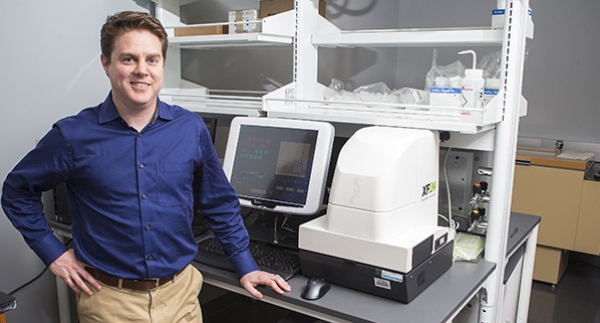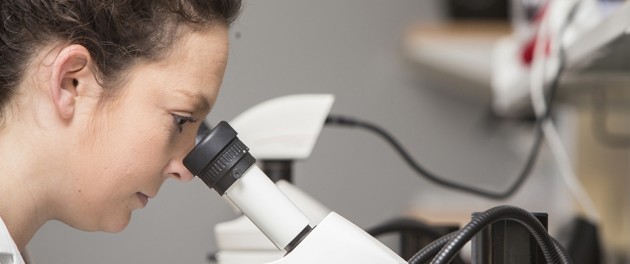The Human Touch Revealing All that is Real
Novel Therapeutics
Publisher's note: The author of this post, Doug Boyd, is a contributor to ECU News Services.
An emerging relationship between East Carolina University and the University of North Carolina at Wilmington may yield ocean-bred therapeutics that target human diseases.
The project is being led by Dan Baden, the William R. Kenan Jr. Distinguished Professor of Marine Science and director of the UNCW Center for Marine Science, and Robert Lust, who chairs the physiology department at the Brody School of Medicine at ECU and serves as interim associate dean for research and graduate studies at the medical school.
"Really, what we're talking about is coastal-human health," Baden said.
The work will be focused on the region and its health needs.
"This is an eastern North Carolina-oriented collaboration that's intended to improve conditions in eastern North Carolina," Lust said.
A joint pre-proposal between UNCW and ECU made it through preliminary rounds with the UNC General Administration, and the universities are working on a final funding application to UNCGA that's due Dec. 5.
If that proposal is funded, a master research agreement, which simplifies sponsored research by setting terms regarding intellectual property, cost and scope of work, would be put in place in mid-February, Lust said.
UNCW is the parent institution of the innovative Marine Biotechnology in North Carolina, or MARBIONC, program. That focuses on the discovery and early translational phases of creating marketable products.
Wilmington is also home to the headquarters of the Marine Bio-Technologies Center of Innovation, a non-profit organization with other offices in Morehead City and Research Triangle Park. It's funded by a $2.5 million grant from the North Carolina Biotechnology Center and would help turn discoveries into products and processes.
Deb Mosca, chief executive of the Marine Bio-Technologies Center of Innovation, said the proposed partnership between ECU and UNCW would be an ideal match of discoveries and the ability to test and develop them. It also could ignite economic growth in North Carolina, with its 300 miles of coastline plus its estuaries.
 "People are recognizing the genetic diversity of the ocean surpasses the genetic diversity of the land," said Mosca, a microbial geneticist. "We have a very strong presence in understanding the interface of the water and human health. We have an opportunity to spur economic growth in an area that's getting a lot of attention."
"People are recognizing the genetic diversity of the ocean surpasses the genetic diversity of the land," said Mosca, a microbial geneticist. "We have a very strong presence in understanding the interface of the water and human health. We have an opportunity to spur economic growth in an area that's getting a lot of attention."
To find the ingredients for these biomedical innovations, scientists at UNCW identify ocean organisms - plants and animals - that look promising then bring them into the lab to study and disassemble them.
"We look for chemistry that hasn't been described before," Baden said.
By partnering with ECU, the marine scientists have access to advanced biomedical methods and instruments to screen for specific chemical systems that could deliver therapeutic effects.
"We're trying to peel away all the inactive chemistry and keep the chemistry that's active," Baden said. If they find a promising compound, they create a pure version of it for pharmaceutical or other applications.
"If it's a new chemical, it's new intellectual property. It gives you a new scaffold to build upon," Baden said.
Lust said the research can also work the other way. "The flip side is we have a medical need for a molecule that behaves like this or works this way," Lust said. "This is what we want. Is (marine biotechnology) a way to make it?"
The MARBIONC team has already brought marine-based drugs to market. One developed from marine algae, Escortin, is capable of "escorting" drugs and medical diagnostic tools directly into cells.
"It could open up a whole new avenue for novel therapeutics," said David Brown, a cardiac physiologist and associate professor of physiology at ECU, who has traveled to UNCW to meet with Baden and see the facilities in Wilmington. Brown's research focuses on the mitochondria inside heart cells, how they affect heart disease and arrhythmia, and how to repair malfunctioning mitochondria.
He can think of several drugs he would like to get to the mitochondria to fix them. "But how do I get them inside the cell?" he asked "This could be a way to bridge that gap."
Another product UNCW has brought to market is Brevenal, which can treat symptoms of patients with cystic fibrosis and chronic obstructive pulmonary disease.
New facilities aimed at advanced research are also part of the collaboration and could help spur industry interest in a time of declining government research grants. A new building in UNCW's CREST Research Park houses MARBIONC, and the Marine Bio-Technologies Center of Innovation is next door.
Last year, ECU finished the fourth floor of the East Carolina Heart Institute, which is an open laboratory that encourages collaboration among biomedical scientists of various disciplines.
"You put all that together, and does the term 'perfect storm' come to mind?" Baden asked.
The group has applied for funding from the National Institutes of Health. North Carolina State University and the North Carolina Small Business and Technology Development Center would also be involved in translating research into marketable products, Baden said.
"Anytime you get the opportunity to talk about a new idea, I think that's exciting for science in general," Lust said. "Everybody can see an amplifying effect. We fully expect the network is going to grow."

ECU researcher David Brown is seeking treatments that would help repair mitochondria inside heart cells. He has met with researchers at UNCW as part of the collaboration.

Second-year doctoral student Lauren Reese conducts research on the fourth floor of the East Carolina Heart Institute, a laboratory space that encourages collaboration across disciplines. A proposed ECU-UNCW partnership will encourage such collaboration in search of marine-based treatments for human disease. (Photos by Cliff Hollis)
Go Back
Research partnership looks seaward for clues to disease
An emerging relationship between East Carolina University and the University of North Carolina at Wilmington may yield ocean-bred therapeutics that target human diseases.
The project is being led by Dan Baden, the William R. Kenan Jr. Distinguished Professor of Marine Science and director of the UNCW Center for Marine Science, and Robert Lust, who chairs the physiology department at the Brody School of Medicine at ECU and serves as interim associate dean for research and graduate studies at the medical school.
"Really, what we're talking about is coastal-human health," Baden said.
The work will be focused on the region and its health needs.
"This is an eastern North Carolina-oriented collaboration that's intended to improve conditions in eastern North Carolina," Lust said.
A joint pre-proposal between UNCW and ECU made it through preliminary rounds with the UNC General Administration, and the universities are working on a final funding application to UNCGA that's due Dec. 5.
If that proposal is funded, a master research agreement, which simplifies sponsored research by setting terms regarding intellectual property, cost and scope of work, would be put in place in mid-February, Lust said.
UNCW is the parent institution of the innovative Marine Biotechnology in North Carolina, or MARBIONC, program. That focuses on the discovery and early translational phases of creating marketable products.
Wilmington is also home to the headquarters of the Marine Bio-Technologies Center of Innovation, a non-profit organization with other offices in Morehead City and Research Triangle Park. It's funded by a $2.5 million grant from the North Carolina Biotechnology Center and would help turn discoveries into products and processes.
Deb Mosca, chief executive of the Marine Bio-Technologies Center of Innovation, said the proposed partnership between ECU and UNCW would be an ideal match of discoveries and the ability to test and develop them. It also could ignite economic growth in North Carolina, with its 300 miles of coastline plus its estuaries.

Post-doctoral scholar Terence E. Ryan conducts research at the fourth floor open laboratory at the East Carolina Heart Institute.
To find the ingredients for these biomedical innovations, scientists at UNCW identify ocean organisms - plants and animals - that look promising then bring them into the lab to study and disassemble them.
"We look for chemistry that hasn't been described before," Baden said.
By partnering with ECU, the marine scientists have access to advanced biomedical methods and instruments to screen for specific chemical systems that could deliver therapeutic effects.
"We're trying to peel away all the inactive chemistry and keep the chemistry that's active," Baden said. If they find a promising compound, they create a pure version of it for pharmaceutical or other applications.
"If it's a new chemical, it's new intellectual property. It gives you a new scaffold to build upon," Baden said.
Lust said the research can also work the other way. "The flip side is we have a medical need for a molecule that behaves like this or works this way," Lust said. "This is what we want. Is (marine biotechnology) a way to make it?"
The MARBIONC team has already brought marine-based drugs to market. One developed from marine algae, Escortin, is capable of "escorting" drugs and medical diagnostic tools directly into cells.
"It could open up a whole new avenue for novel therapeutics," said David Brown, a cardiac physiologist and associate professor of physiology at ECU, who has traveled to UNCW to meet with Baden and see the facilities in Wilmington. Brown's research focuses on the mitochondria inside heart cells, how they affect heart disease and arrhythmia, and how to repair malfunctioning mitochondria.
He can think of several drugs he would like to get to the mitochondria to fix them. "But how do I get them inside the cell?" he asked "This could be a way to bridge that gap."
Another product UNCW has brought to market is Brevenal, which can treat symptoms of patients with cystic fibrosis and chronic obstructive pulmonary disease.
New facilities aimed at advanced research are also part of the collaboration and could help spur industry interest in a time of declining government research grants. A new building in UNCW's CREST Research Park houses MARBIONC, and the Marine Bio-Technologies Center of Innovation is next door.
Last year, ECU finished the fourth floor of the East Carolina Heart Institute, which is an open laboratory that encourages collaboration among biomedical scientists of various disciplines.
"You put all that together, and does the term 'perfect storm' come to mind?" Baden asked.
The group has applied for funding from the National Institutes of Health. North Carolina State University and the North Carolina Small Business and Technology Development Center would also be involved in translating research into marketable products, Baden said.
"Anytime you get the opportunity to talk about a new idea, I think that's exciting for science in general," Lust said. "Everybody can see an amplifying effect. We fully expect the network is going to grow."

ECU researcher David Brown is seeking treatments that would help repair mitochondria inside heart cells. He has met with researchers at UNCW as part of the collaboration.

Second-year doctoral student Lauren Reese conducts research on the fourth floor of the East Carolina Heart Institute, a laboratory space that encourages collaboration across disciplines. A proposed ECU-UNCW partnership will encourage such collaboration in search of marine-based treatments for human disease. (Photos by Cliff Hollis)
| In the Christmas Spirit: Walk Off the Earth | East Carolina University, School News, The Region, Neighboring Counties | Optimal Benefits |





















